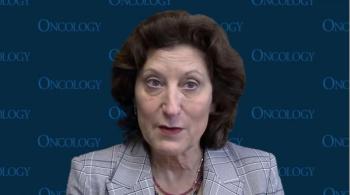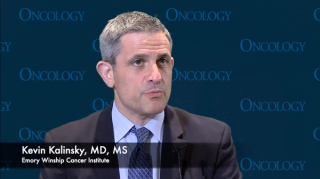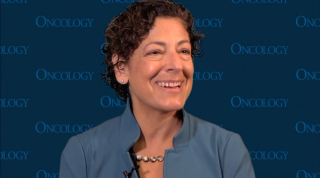
Breast Cancer
Latest News
Latest Videos

CME Content
More News

Investigators report a disparity in survival among Black patients with inflammatory breast cancer, although receipt of treatment does not appear to vary according to race.

Use of an ixabepilone-based companion diagnostic may identify patients with metastatic breast cancer who may benefit from ixabepilone monotherapy.

Iopromide injection becomes the first FDA-approved contrast agent for visualizing known or suspected breast lesions in adult patients.

Data from the phase 3 CAPItello-291 trial support the new drug application for capivasertib plus fulvestrant as a treatment for patients with hormone receptor–positive, HER2-negative breast cancer.

Daniel G. Stover, MD, describes how findings from the phase 3 NATALEE trial may support expanding the portion of patients who receive CDK 4/6 inhibitors as a treatment for hormone receptor–positive, HER2-negative breast cancer.

Daniel G. Stover, MD, suggests that stromal tumor infiltrating lymphocytes may serve as a biomarker of immune activation and can potentially help optimize therapy with microtubule-targeting agents for patients with metastatic breast cancer.

Sara M. Tolaney, MD, MPH, discusses how, compared with antibody-drug conjugates, chemotherapy produces low response rates and disease control in the treatment of those with hormone receptor–positive, HER2-negative metastatic breast cancer.

Hope Rugo, MD, speaks to the importance of identifying patients with aromatase inhibitor–resistant, hormone receptor–positive, HER2-negative advanced breast cancer who are undergoing treatment with capivasertib/fulvestrant who may be at a high risk of developing diabetes or hyperglycemia.

The anti-tumor activity of lasofoxifene plus abemaciclib does not appear to be compromised by co-occurring alterations that confer resistance among patients with estrogen receptor–positive HER2-negative breast cancer.

Additionally, treatment with sacituzumab govitecan-hziy may result in a prolonged overall response rate and clinical benefit rate vs treatment of physician’s choice in pretreated, endocrine-resistant, hormone receptor–positive, HER2-negative metastatic breast cancer.

Treatment with patritumab deruxtecan appears to yield improved responses in patients who have been heavily pretreated for metastatic breast cancer.

Sara M. Tolaney, MD, MPH, describes the benefit of sacituzumab govitecan for patients with HER2-low metastatic breast cancer seen in the final overall survival analysis of the phase 3 TROPiCS-02 study.

Zotaifin plus abemaciclib and fulvestrant appears to produce no dose-limiting toxicities among patients with estrogen receptor–positive metastatic breast cancer in a phase 1/2 study.

Elacestrant also appears to produce a manageable safety profile in the treatment of patients with estrogen receptor–positive HER2-negative advanced breast cancer in the phase 3 EMERALD trial.

Older patients with hormone receptor–positive, HER2-negative, high-risk early breast cancer maintain a clinically meaningful absolute reduction in risk of distant relapse and invasive disease following treatment with abemaciclib and endocrine therapy.

Results from the phase 3 NATALEE trial investigating ribociclib plus endocrine therapy may change practice for the treatment of hormone receptor–positive or HER2-negative early breast cancer, according to an expert from the University of Chicago Medicine.

Findings from the phase 3 DAWNA-2 trial suggest that dalpiciclib plus endocrine therapy may be a potential novel first-line treatment option for hormone receptor–positive, HER2-negative advanced breast cancer.

18F-Fluorestradiol is currently the only imaging agent approved by the FDA for assessing estrogen receptor–positive lesion status to better guide treatment decision-making.

Data from a phase 3 study indicate that weight loss intervention with a telephone-based program appears to be effective across all subgroups of breast cancer survivors.

Supporting data for the supplemental new drug application for toripalimab plus chemotherapy in recurrent metastatic triple-negative breast cancer come from the phase 3 TORCHLIGHT study.

The FDA also accepts a premarket approval application for the Lumicell Direct Visualization System in the breast cancer space.

Trial findings indicate melatonin may be a potentially effective solution for reducing the incidence and severity of cancer-related fatigue among patients with breast cancer.

An additional 5 years of adjuvant aromatase inhibition following initial therapy may improve survival outcomes among disease-free patients with postmenopausal breast cancer, according to results from the phase 3 AERAS study.

The next leap forward in breast cancer is identifying patients who would best benefit from a treatment de-escalation approach through the use of precision medicine.

“Sometimes we have to advocate, but mostly we have to hire experts in our practice who can access these agents through free assistance programs, partial assistance, copay assistance, etc. That is an effort, a big part of the infrastructure and practices, to be able to access therapies.”









































